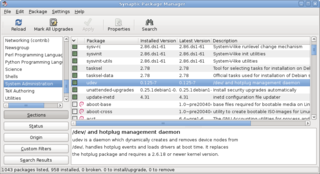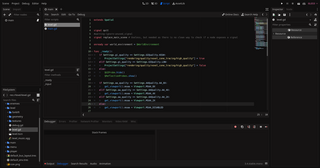
Common Lisp (CL) is a dialect of the Lisp programming language, published in American National Standards Institute (ANSI) standard document ANSI INCITS 226-1994 (S20018). The Common Lisp HyperSpec, a hyperlinked HTML version, has been derived from the ANSI Common Lisp standard.

Dylan is a multi-paradigm programming language that includes support for functional and object-oriented programming (OOP), and is dynamic and reflective while providing a programming model designed to support generating efficient machine code, including fine-grained control over dynamic and static behaviors. It was created in the early 1990s by a group led by Apple Computer.

Emacs Lisp is a dialect of the Lisp programming language used as a scripting language by Emacs. It is used for implementing most of the editing functionality built into Emacs, the remainder being written in C, as is the Lisp interpreter. Emacs Lisp is also termed Elisp, although there are also older, unrelated Lisp dialects with that name.
An integrated development environment (IDE) is a software application that provides comprehensive facilities for software development. An IDE normally consists of at least a source-code editor, build automation tools, and a debugger. Some IDEs, such as NetBeans and Eclipse, contain the necessary compiler, interpreter, or both; others, such as SharpDevelop and Lazarus, do not.

A package manager or package-management system is a collection of software tools that automates the process of installing, upgrading, configuring, and removing computer programs for a computer in a consistent manner.
In computer science, a preprocessor is a program that processes its input data to produce output that is used as input in another program. The output is said to be a preprocessed form of the input data, which is often used by some subsequent programs like compilers. The amount and kind of processing done depends on the nature of the preprocessor; some preprocessors are only capable of performing relatively simple textual substitutions and macro expansions, while others have the power of full-fledged programming languages.

The GNU Autotools, also known as the GNU Build System, is a suite of programming tools designed to assist in making source code packages portable to many Unix-like systems.
In software development, Make is a build automation tool that builds executable programs and libraries from source code by reading files called makefiles which specify how to derive the target program. Though integrated development environments and language-specific compiler features can also be used to manage a build process, Make remains widely used, especially in Unix and Unix-like operating systems.

In software development, GNU Automake is a programming tool to automate parts of the compilation process. It eases usual compilation problems. For example, it points to needed dependencies.
MinGW, formerly mingw32, is a free and open source software development environment to create Microsoft Windows applications.

Windows Installer is a software component and application programming interface (API) of Microsoft Windows used for the installation, maintenance, and removal of software. The installation information, and optionally the files themselves, are packaged in installation packages, loosely relational databases structured as COM Structured Storages and commonly known as "MSI files", from their default filename extensions. The packages with the file extensions mst contain Windows Installer "Transformation Scripts", those with the msm extensions contain "Merge Modules" and the file extension pcp is used for "Patch Creation Properties". Windows Installer contains significant changes from its predecessor, Setup API. New features include a GUI framework and automatic generation of the uninstallation sequence. Windows Installer is positioned as an alternative to stand-alone executable installer frameworks such as older versions of InstallShield and NSIS.

SCons is a computer software build tool that automatically analyzes source code file dependencies and operating system adaptation requirements from a software project description and generates final binary executables for installation on the target operating system platform. Its function is analogous to the traditional GNU build system based on the make utility and the autoconf tools.
Maven is a build automation tool used primarily for Java projects. Maven can also be used to build and manage projects written in C#, Ruby, Scala, and other languages. The Maven project is hosted by The Apache Software Foundation, where it was formerly part of the Jakarta Project.

In software development, CMake is cross-platform free and open-source software for build automation, testing, packaging and installation of software by using a compiler-independent method. CMake is not a build system itself; it generates another system's build files. It supports directory hierarchies and applications that depend on multiple libraries. It is used in conjunction with native build environments such as Make, Qt Creator, Ninja, Android Studio, Apple's Xcode, and Microsoft Visual Studio. It has minimal dependencies, requiring only a C++ compiler on its own build system.
Sandcastle is a documentation generator from Microsoft. It automatically produces MSDN-style code documentation out of reflection information of .NET assemblies and XML documentation comments found in the source code of these assemblies. It can also be used to produce user documentation from Microsoft Assistance Markup Language (MAML) with the same look and feel as reference documentation.

A scripting language or script language is a programming language that is used to manipulate, customize, and automate the facilities of an existing system. Scripting languages are usually interpreted at runtime rather than compiled.

sbt is an open-source build tool created explicitly for Scala and Java projects. It aims to streamline the procedure of constructing, compiling, testing, and packaging applications, libraries, and frameworks. sbt is highly adaptable, permitting developers to customize the build process according to their project's specific needs.

Meson is a software tool for automating the building (compiling) of software. The overall goal for Meson is to promote programmer productivity. Meson is free and open-source software written in Python, under the Apache License 2.0.









